




All the essential issues in Massachusetts trust law and practice can be found in this book, including formation of the trust; duties, powers, and liabilities of trustees; responsibilities for various types of trust investments, including guidance on the Massachusetts Prudent Investor Act; distribution, funding, and accounting issues; duties relating to income tax and GST tax; obtaining the court's assistance with trust administration; administration of charitable trusts; and trust termination.
Two critical areas of trust-related law practice are explored in detail: lawyers acting as trustees and lawyers representing trustees. A number of difficult regulatory and ethical issues are raised by these types of practice, and Understanding and Using Trusts explores these issues in depth. Practice notes are included throughout the book on best practices to adopt and potential pitfalls to avoid when exercising trustee powers and advising clients.
Dear Subscriber:
Thank you for choosing to stay current with developments in the law of trusts, with this 2024 edition of Understanding and Using Trusts . Inside, you will find new material on such topics as these:
We at MCLE trust that you will find this material useful in your law practice and valuable in keeping your law library current.
Cordially,
MCLE Press

















